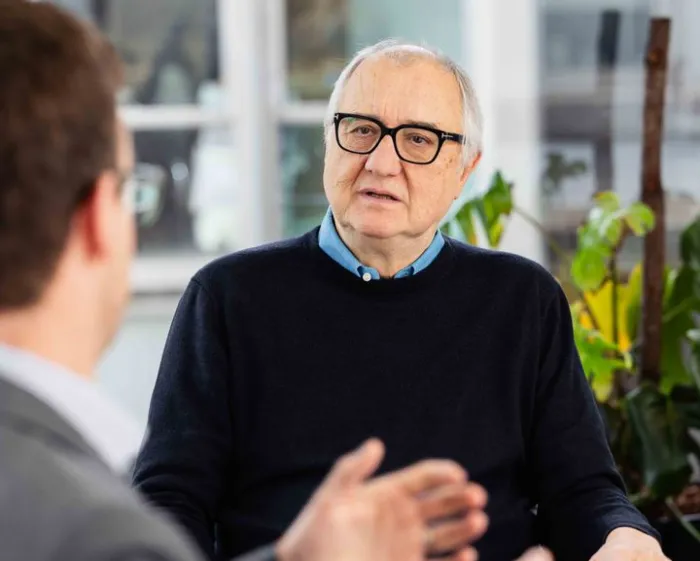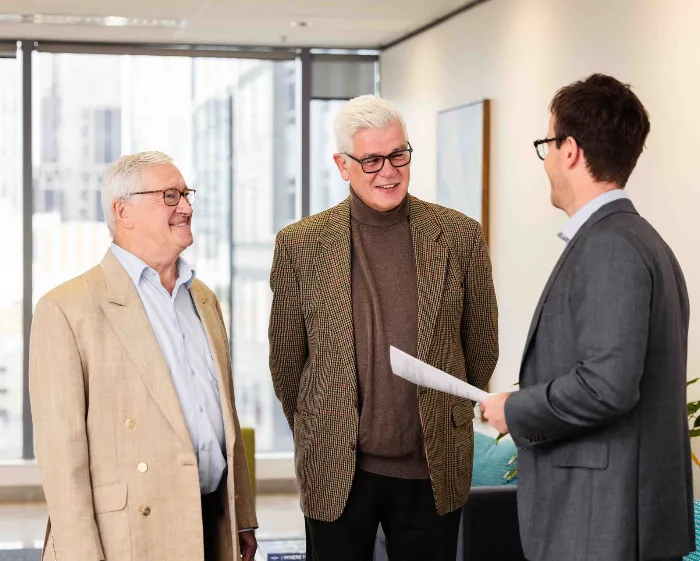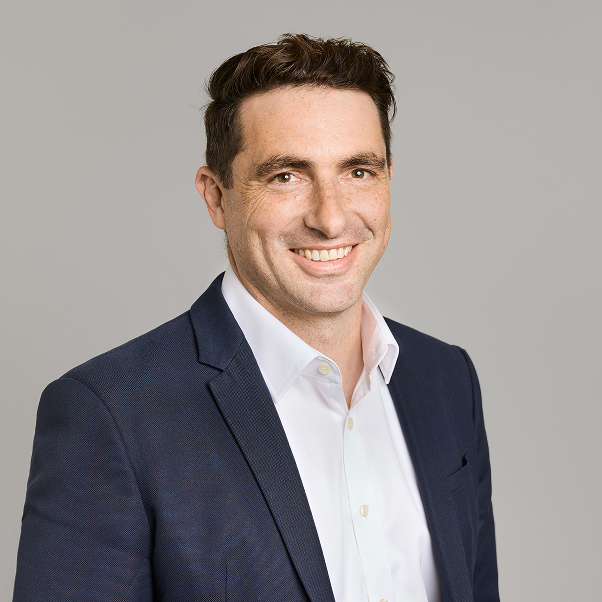Financial
Roadmap
A clear, personalised path to your financial goals.
Some of the information in this article may be out of date. We are currently in the process of updating our content to reflect FY26 details.

When you start investing in the share market, you embrace the process with optimism. No one starts a share portfolio expecting it to fail… you want it to build over the years to provide you with financial security well into the future.
Unfortunately, market volatility is a part of the process and it can dent your optimism, setting you on a roller-coaster of emotions.
Ben Rossi, Principal and First Financial Managing Director, discusses the emotional cycle that accompanies market downturns… highlighting common reactions and showing how it’s possible to reach the light at the end of the tunnel.
At the very beginning of a market downturn, investors often believe that the drop is simply an anomaly. They don’t see an immediate threat and they continue to ride the thrilling emotional wave that accompanies positive returns. But Ben says that this is more like complacency.
“Initially, people think – a 2% drop… that’s nothing, it’s just a blip. We shouldn’t overreact.”
Of course, this is a natural response to have when the share market has been performing well, so it’s not surprising that it can take time for people to acknowledge the beginning of a slump. No one wants to start shouting that the world is ending when it’s just a minor adjustment.
The next step in the emotional cycle is realisation. This occurs once the market has continued to track a downward trend. Investors recognise that there is a shift and they start to pay attention. Ben describes this as a moment of heightened awareness.
“This is when people start to feel – this is real, this is not just a little hiccup… something has actually happened and wow, it seems like it’s significant.”
This is often when investors will start to consider moving their portfolio across to defensive assets. Watching investments decline in value causes uncertainty and triggers a natural instinct to protect what you have left.
Thankfully, for First Financial clients, we structure portfolios according to our unique Investment Philosophy where growth assets are protected from short-term selling risks. Forced selling or moving to defensive fixed income assets or cash is rarely needed in our model.
The realisation of a market downturn leads us to fear, especially if it is clear that the financial crisis is deepening. Ben explains,
“At this point, it just keeps getting worse. Every time you check, the market has dropped again. We saw this during the horrific week that started on Monday 9th March 2020. It felt like it would never stop – this is the fear.
The media love this part… all of a sudden there are headlines everywhere. About how ‘it’s finished, the world is over, we’ll never recover’. In the most recent examples when combined with COVID-19, all we see are headlines saying we will never get back to where we were… EVER!”
The anxiety associated with fear can be crippling. We know that this is the dramatic point where some investors will want to withdraw from the market altogether. However, history shows us that if you can resist the internal discourse that makes you want to sell, you should eventually see a recovery.
For most investors, the emotion they are likely to experience next is despair. This is caused by the continued negative results and the gravity of the market drop taking hold.
Ben believes this can also be amplified by the input of others,
“People start to think… what’s the use? It’s all over anyway. They resign themselves to the losses. They really feel despair.
This is also when you get people who say, ‘I told you so’… those people come out and say, ‘I predicted this 14 and a half years ago, I said this was going to happen!’
What they don’t tell you is that they said it 62 different times… and 61 of the times they said it, it didn’t happen. But this time it has, so… I told you so!”
It can be difficult to ignore the noise, especially if you have people close to you proclaiming their market foresight. We humans tend to feel the weight of a negative experience far greater than the lift of a positive one… it’s just the way our brains are wired.
While many will say “cut your losses” at this point, it could actually be a moment of real opportunity. Investing or staying invested during these low points can sometimes be highly beneficial. This is true for those who have many years before retirement, or many years of retirement left.
In times like this, it’s important to keep your long-term goals in mind. As you build your wealth there will be many movements in the share market, but if you stay on your path you will keep moving towards the future you see for yourself.
Whenever you reach the point of despair, there is an inevitable glimmer of hope. This usually comes in the form of a small amount of positive growth. Ben says,
“When we see evidence of a small upward turn in the market, it shows us some light at the end of the tunnel… but it’s just a flash. This is where hope starts to form.”
People tend to still have a cautious view at this point. They could be dubious about whether the market is rising and be reluctant to invest more in case of further negative returns.
As the market does start to improve, it can actually be frustrating rather than liberating. The progress is often slow to get started and constant debate about recovery is tiring. Investors often feel like they move one step forward then two steps back.
“The situation is getting better but keeps slipping back… this is the frustration we are experiencing now! We are going through the cycle where it’s getting better for a while… then you have three days of negative returns.
This causes people to think, ‘Oh no, it was just a dead cat bounce.’ Then you get another three days of growth and it slips back again… people just get frustrated. The big question is, are we in recovery or are we not?”
Ben describes post-recovery emotions as the memory phase. This is when the next bull market has taken over… the economy is strong and employment levels are increasing.
“There are many instances where this has happened in history and we always say the same thing… ‘Do you remember how cheap those shares were? I should have sold my house and put money in the market… I would have been set now!’
It’s understandable. We all go through that… the GFC is a classic example… you talk about the GFC cycle now and everybody says the same thing, ‘I should have invested money… I can’t believe I missed that one.’”
Of course, hindsight is a wonderful thing, and at the time the GFC felt like the worst downturn in global market history. The key message is that during a financial crisis, it’s important to remember that your focus should always be on the long term.
Ben concludes,
“Don’t try to avoid market corrections, you will be wrong more times than you are right… plan for them in advance… plan what to do when it happens, not if it happens.”
We know that emotions are complex. They are all completely valid and normal psychological responses to market volatility. While they can be challenging to overcome, if you can understand how you are feeling it can help you to remain rational and minimise the risk of making impulsive decisions. This is where a financial adviser can offer you support and guide you through the tough times.
Our advisers a sounding board when you are feeling overwhelmed and help you to navigate the ups and downs to make sure you stay on course.
Here at First Financial, we offer strategic advice that will benefit you long into the future.
If you want to speak to a financial adviser about the current market downturn, please contact our team today. Read another investments article.
Every client journey begins with a conversation. We look closely at where you are now, what matters to you, and what’s possible. Then we structure our advice to match.
A clear, personalised path to your financial goals.
Proactive strategies to maximise your tax savings.
Tailored plans aligned with your goals and risk profile.
Regular guidance to keep your plan on track.
Retired widow
Lyn stepped into financial management for the first time after her husband's passing. With patience and care, First Financial supported her through grief, learning, and empowerment.
“After my husband passed, I was completely unsure where to start. First Financial gave me the space to learn, to ask questions, to grow confident. They drew a diagram that I still have. And now, I sleep well at night knowing I’ve got someone in my corner.”

Newly retired
As retirement neared, Larry and Virginia were ready to enjoy travel, family, and freedom, without uncertainty. A friend recommended First Financial, and from the first meeting, they had a clear plan, a safety net, and people they trusted.
“We’ve travelled the world, Europe, Sri Lanka, Vietnam, without once stressing about the money. They made everything feel simple and gave us the confidence to live well. We feel secure because we know exactly where we stand, and that peace of mind means everything.”

Retired business owner
After decades of running a successful pharmacy, John sought financial guidance to simplify decision-making and support long-term planning.
“I feel genuinely supported by First Financial. I can ask anything, and there’s no pressure, just clear advice and real care. The money’s growing, I’m not stressed about it, and I feel completely at ease for the first time. I don’t miss work, but I’d miss the support I get from First Financial.”

Retired
Jan's husband managed the finances until entering aged care. Jan gradually stepped into the financial picture with First Financial’s support.
“The money just comes in. I don’t have to think about it. And I know they’re always there. They’ve always been there in the background, just quietly making things work.”

Early retirement and working professional
When Tim received an overseas medical settlement, he and Adam had just 14 days left in a 90-day window. They needed clear guidance, fast. A referral led them to First Financial.
“We’re in totally different life stages, but First Financial built a strategy that supports us both. From urgent legal steps to ethical investing, they handled every detail with calm, care, and real expertise. It’s financial freedom without compromise, and we couldn’t have done it without them.”

Retired and semi-retired
Referred by friends who were helped through aged care, Craig sought secure financial guidance after inheriting funds.
“We feel very secure with First Financial, the income just comes in, and we know everything is being looked after. It’s not just safe, it’s smart. We’ve recommended them to others because we genuinely believe in the team.”









You can use the form below to make a general or initial enquiry.
You can also book a 15-minute call with an adviser by clicking the blue button below.
You can use the form on the right to make a general or initial enquiry.
You can also book a 15-minute call with an adviser by clicking the blue button below.
Fill in your details and briefly let us know how we can help.
We’ll reach out to schedule a time that suits you.
Enjoy an obligation-free initial meeting to discuss your goals and explore how we can guide you toward financial confidence.
Let’s start the conversation.
We look forward to hearing from you!
Level 9, 90 Collins Street,
Melbourne, VIC, 3000
Office Hours
Mon – Fri | 9:00 am – 5:00 pm